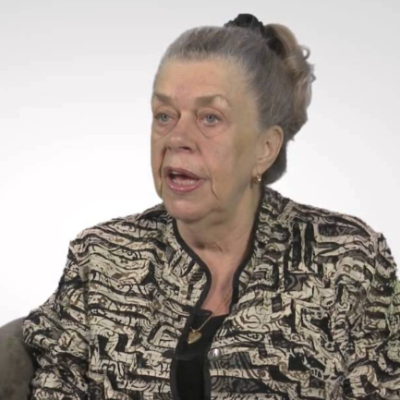The late Anthony Minghella’s elaborately stylized 2006 production of Madama Butterfly, which originated at English National Opera, is back at the Met for its ninth revival. Choreographed and directed by Minghella’s widow, Carolyn Choa, the abundantly artful staging revels in modernism, featuring Japanese fan dances, static tableaux, hanging lanterns, floating cherry blossoms, sliding shoji screens, piles of peonies and a battalion of supernumeraries, all in eye-popping colors and reflected in a huge, tilted mirror overhanging the stage. The presentation’s most unusual feature is the use of a Bunraku-style wooden puppet to portray “Sorrow”, the title character’s three-year-old son. The marionette, skillfully manipulated by three black-clad members of the Blind Summit Theatre, moves with uncannily human-like gestures, but with its bald head and emaciated, shriveled appearance, it is less than alluring.
What is alluring about this Met run is Alexandra Kurzak’s charismatic performance in the demanding role of Cio-Cio San, the central character in Puccini’s tragic tale of a 15-year-old geisha who marries an American Naval officer who abandons her shortly after their wedding and later returns to Japan with his new wife. A successful presentation of the opera rests squarely on the shoulders of the singer in the title role. She is on stage nearly all of the time and needs to convey a staggering variety of emotions and negotiate an array of complex musical passages that challenge both her interpretive insight and technique.
Though she has sung the part elsewhere – most recently at the Arena di Verona – this was Kurzak’s first time taking it on at the Met, and she triumphed, creating a completely convincing portrayal, both dramatically and vocally, of a selfless young woman who evolves from naïve adolescence to unwavering faith in love, to heartbreak and disillusionment, and then finally chooses to take her own life. Her large and luminous lyric soprano displayed a remarkable range of colors and nuances, most notably in her two big arias: “Un bel di vedremo” in Act 2 where, three years after Pinkerton has left her, she sings of the day when he will return, and “Che tua madre” in Act 3 when, consumed with despair and resolved to kill herself, she tells her child that he will never remember her or that she died for him.
Kurzak was well-partnered with Matthew Polenzani who, in another Met role debut, brought an easy-going arrogance to the callous character of Pinkerton. His robust tenor was bright at the top and well integrated with the rest of his voice, and it blended beautifully with Kurzak’s ringing soprano in “Bimba, Bimba, non piangere”, their long and rapturous love duet at the end of Act 1.
A veteran of this production – having sung the role of 26 times over the course of the Met’s three previous revivals – Elizabeth DeShong is the Met’s go-to Suzuki. She offered a poignantly stoic portrait of Butterfly’s loyal and devoted handmaiden and contributed greatly to the energy and emotional impact of the drama. With her strong stage presence, superb acting skills and commanding mezzo-soprano, she was a frequent scene stealer, and immensely affecting in her understated laments of “Povera Butterfly”.
As the aimable and kindhearted Sharpless, the US consul in Nagasaki who advises his friend Pinkerton not to toy with Butterfly’s feelings, Davide Luciano exuded sympathy and consistently delivered with his resonant and flexible baritone. He had some tremendously moving moments, nowhere more so than in his Act 2 scene with Butterfly where, over her constant interruptions, he tries to read her Pinkerton’s letter.
Making her company debut in the pit was conductor Xian Zhang, eliciting superb music-making from the orchestra and allowing Puccini’s magnificent score to work its magic throughout the evening. The ensemble’s playing was its most admirable and moving in the swelling lines accompanying the singers in the stately trio of Act 3 where Pinkerton, Sharpless and Suzuki grapple with the dilemma of telling Butterfly the appalling truth. The great Met Chorus was responsive as always, capturing the enchantment of Butterfly’s entrance music and the fragility of her hopes in the famous Humming Chorus.




